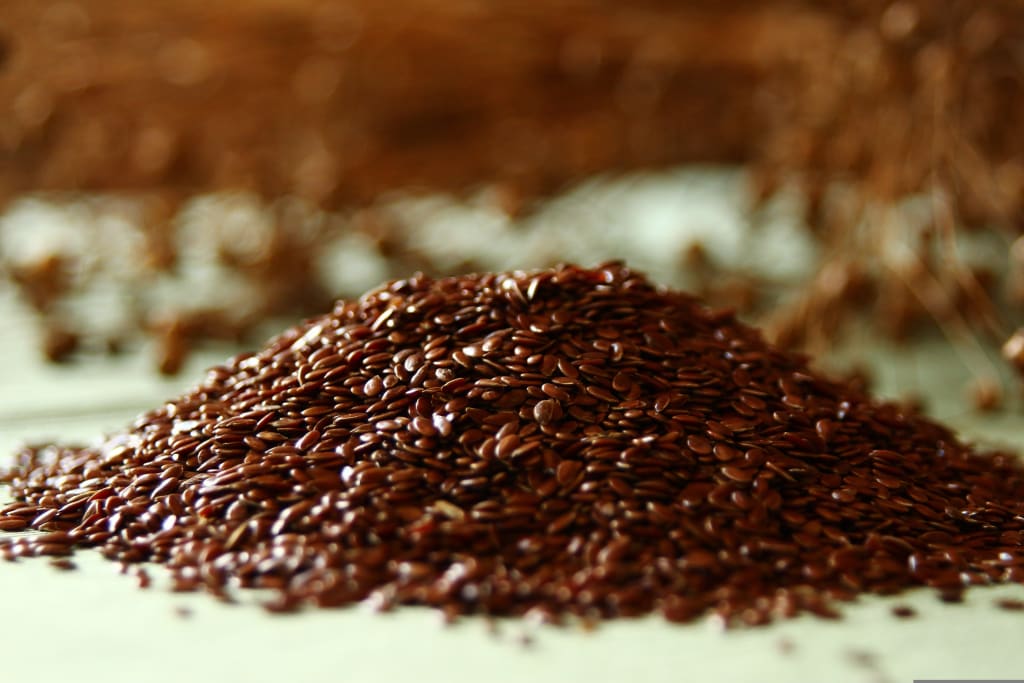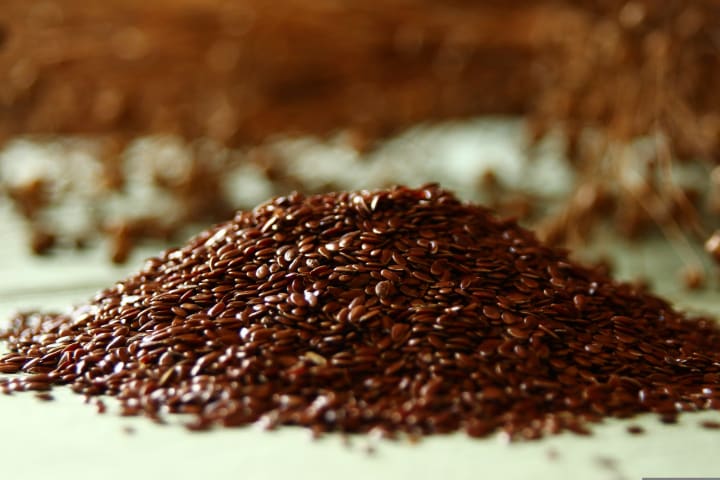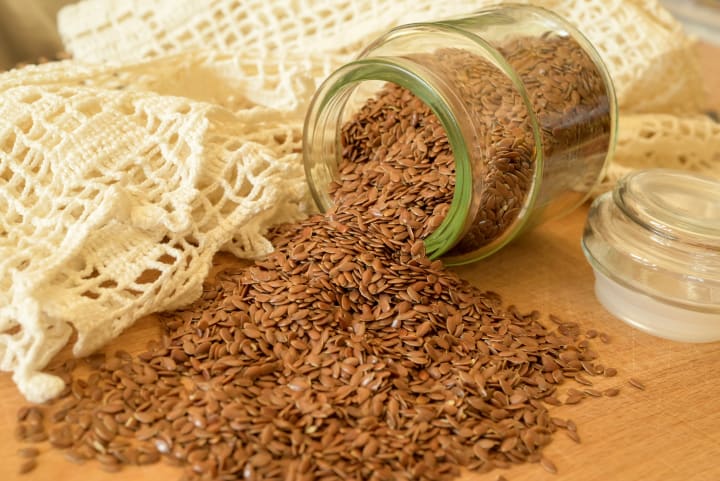benefits of flaxseeds for hair and skin
benefits of flaxseeds for hair and skin

What is flaxseed
Flaxseeds (in English: Linseed), are soft and shiny brown seeds, and they are edible, as they are used as one of the healthy foods, and they are an important source of omega-3 acids and dietary fiber.
Flaxseeds were consumed from ancient times during the time of the Greeks and Romans, because they contain many nutrients necessary for health, the most important of which are protein, iron, calcium, manganese, thiamine, magnesium, phosphorus and copper.
Flaxseeds can be eaten roasted or raw, and they may be ground and added to baked goods, salads, and juices, and flaxseed oil, which is very beneficial for skin and hair, can be extracted from them.

Flaxseed nutritional value
Flaxseeds contain many nutrients, active substances, vitamins, minerals and healthy omega-3 fats. A tablespoon of ground flaxseed weighing 7 grams contains the following nutrients:
Calories: 37.4 calories.
Protein: 1.28 g.
Fat: 2.95 g.
Carbohydrates: 2.02 g.
Dietary fiber: 1.91 g.
Calcium: 17.8 mg.
Magnesium: 27.4 mg.
Phosphorus: 44.9 mg.
Potassium: 56.9 mg.
Folic acid: 6.09 micrograms.
Lutein and zeaxanthin: 45.6 mcg.
Flaxseeds are rich in fiber and low in carbohydrates, which means that they prevent constipation and contribute to the removal of toxins from the body.
Flaxseeds are high in omega-3 fatty acids, which are essential for maintaining health. Flaxseeds are gluten-free, which means they are a great alternative for people with a gluten sensitivity.
Benefits of flaxseeds for the heart
Flaxseeds contribute to lowering the level of cholesterol and triglycerides in the blood, due to its rich content of dietary fiber and omega-3, which prevents heart disease and atherosclerosis, as the continuous consumption of flaxseeds contributes to reducing the risk of these diseases.
Benefits of flaxseed for diabetes
Eating flaxseeds on a regular basis works to:
Reduces blood sugar level and contributes to its regulation.
Eating flaxseed improves insulin sensitivity and reduces insulin resistance.
Provides the body with strengthening antioxidants that protect the pancreas from damage, which is responsible for insulin secretion.
Benefits of flaxseeds for hair and skin
The fatty acids in flaxseed are beneficial for:
Preserving hair, giving it strength and shine, and reducing hair loss.
Hair resistance to damage increases, due to the presence of essential fatty acids, which are essential in the composition of hair follicles.
Flaxseed keeps the skin healthy and reduces dryness.
Relieves symptoms of skin disorders such as acne and eczema.
Flaxseed oil is one of the best oils that can be used to maintain healthy hair, skin, nails, and eyes as well, due to its high concentration of healthy fats.
Healthy hair and clear skin can be obtained by adding two tablespoons of flaxseeds to the daily diet, or using flaxseed oil topically on hair and skin to get hydration and get rid of dryness.
For more: the benefits of flaxseeds for hair
Benefits of flaxseed for blood pressure
Eating flaxseeds regularly for three months lowers blood pressure and helps regulate it and maintain its balance in the body.
For more: the benefits of flaxseeds for pressure patients
Benefits of flaxseed for the digestive system
Flaxseeds promote a healthy digestive system by:
Reducing infections of the inner lining of the digestive system, and treating ulcers.
Enhancing the function of natural bacteria in the colon, which helps it get rid of waste and toxins.
Regulating bowel movement, which reduces the chance of constipation, as flaxseeds are a natural laxative for the intestines, and they also protect against colon irritation.
Benefits of flaxseed for cancer
Flaxseeds contribute to the prevention of several types of cancer such as breast cancer, prostate cancer, ovarian and colon cancer, so flaxseeds should be added to the daily diet.
Benefits of flaxseed for slimming
Eating flaxseed supports the process of losing weight and reducing obesity, due to the healthy fats and fibers in flaxseeds that give a feeling of satiety for a longer period, which prevents eating more calories, thus losing weight and reaching a healthy weight.
For more: the benefits of flaxseed for slimming

Benefits of flaxseed for the treatment of arthritis
Flaxseed oil is one of the oils that arthritis patients are advised to use topically for massage, especially for those who suffer from knee pain, as it contains omega-3, which is beneficial for joints.
Benefits of flax seeds for women
Eating flaxseed reduces the symptoms of menopause, menopause and hormonal imbalance, so flaxseed can be used as a complementary treatment to balance hormones because it contains estrogen-like properties.
Among the benefits of flaxseed for the menstrual cycle is that it helps in:
Regulating the menstrual cycle.
Stimulating ovulation.
Reducing the risk of osteoporosis associated with menopause.
How to use flaxseed
Flaxseeds can be added to the diet in the following ways:
Mix flaxseeds with your breakfast cereal.
Add flaxseeds to muffins.
Add them to salads or mayonnaise.
Mix flaxseeds with yogurt or smoothies.
Flaxseed damage
Flaxseeds can cause some side effects, as raw seeds can contain toxins, but they disappear after roasting. You should also drink plenty of water when eating flaxseeds, because not drinking enough quantity leads to constipation and disorders in the digestive system.
Contraindications for the use of flaxseed
There are some groups that must be careful when using flaxseeds, including the following:
Pregnant women: Flaxseeds can lead to hormonal disorders during pregnancy, which may pose a risk to pregnancy, so it is best to avoid eating them during pregnancy.
Surgical operations: Eating flaxseed oil may reduce blood clotting, which may lead to bleeding during surgery, so it should be avoided at least two weeks before the date of the scheduled surgery.
Taking medications: Eating flaxseeds can interfere with some pharmacological treatments such as blood pressure lowering drugs and sugar-lowering drugs, so you should consult a doctor in these cases before taking flaxseeds.
Allergies: Flaxseeds may cause allergies to some people, and in this case they should avoid eating them.






Comments
There are no comments for this story
Be the first to respond and start the conversation.